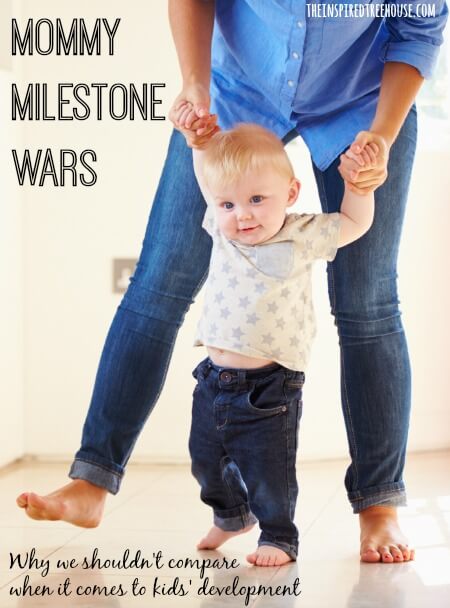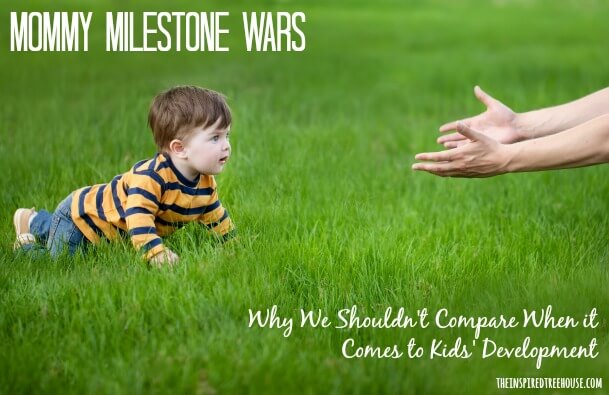
As parents, the idea of developmental milestones is usually planted in our heads on the day of our baby’s first visit to the pediatrician.
The concept of these milestones becomes ingrained in us – often beginning as a subtle undercurrent of worry: Is she alert? Is she reaching for toys? And sometimes evolving into full-blown fear: Why isn’t he walking yet? Will she ever start talking?
As a new mom, I was often shocked by the intense scrutiny of other moms: the “developmental milestone competition”. I cringed every time I heard someone proudly proclaiming that her child was ahead of the game with gross motor skills and how surely he would be the next Michael Jordan (yes, I am dating myself a little here). Other moms went on about how their children were reading at age 4, making them obvious candidates for a future Nobel Prize.
I think these conversations bothered me most because of my work and experience as a pediatric physical therapist. Each and every day, I see parents of children with special needs celebrate seemingly simple developmental gains. Maybe their child is 5 years old and just learning to roll over for the first time or their 3-year-old is just taking her first steps.
To see the determination, love, and patience that goes into the achievement of hard-won goals like this is enough to bring anyone to tears. I witness it almost every day and it really puts things into perspective.
So what is it with our need to compete when it comes to our kids’ development? Why make that first time mom feel so insecure about how her baby is progressing, or worse, insinuate that she might be doing something wrong?
Are we really this insecure? Or maybe it’s that we live in a culture and a day in age that values competition and winning more than it values true wellness or individual strengths and needs.
The bottom line is, kids are all wired to develop at their own pace. And what’s more, there are tons of external factors that contribute to child development. Individual family culture, beliefs, attitudes, schedules, priorities, and practical limitations all play a role in the experiences our children are exposed to and when they are exposed to them.
We’re not talking right or wrong here…just different! These differences can have varying effects on developmental timelines that are all within the “typical” range. Guess what? These differences also make the world go ‘round! How boring would it be if we all raised our kids exactly the same way? Who wants a planet full of developmental robo-kids? Not us!
The one thing we do preach is that we see a glaring trend these days of kids from all types of families who are not getting exposure to the frequent and regular free play, movement, and exploration experiences they need for healthy development. It’s something even we as child development professionals have to pay attention to with our own kids – everyone needs the occasional reminder to get the kiddos off the couch and away from that iPad!
Based on our experience, a good mix of structured and unstructured fine motor, gross motor, and sensory play seems to be the recipe for success when it comes to healthy development for most kids.

If you’re feeling stress about keeping up with the baby next door, keep these tips in mind:
Every child is different. They all have strengths as well as areas that are slower to develop. Some, like my first born, walk before they even look old enough to be crawling! Others, like my second born, take quite a bit longer to get the hang of walking (17 months to be exact), but excel when it comes to fine motor skills. Every child develops on their own schedule.
Your pediatrician is your friend. Your mother-in-law, best friend, and every author of every best-selling parenting book under the sun can tell you pretty much anything you want (or don’t want) to hear about how your child is developing. Listen to the advice of trained child development professionals who you trust and who have taken the time to get to know your child and your family. These professionals should take the time to listen to your questions and concerns and they should take them seriously – after all, you know your child better than anyone else! If you’re not getting your questions answered thoroughly – it may be time to look for a new doctor. As long as your child is following general developmental guidelines and your trusted pediatrician is not concerned, you shouldn’t be either!
Do everything you can to allow your child the opportunity to develop naturally and on her own schedule. Put her on the floor for tummy time, roll around with her, take her for strolls in the park, let her climb up those stairs while you stay closely behind, swing her on the swings, splash in the pool…relax, play, and have fun!

Be sure to sign up for our newsletter! You’ll get a weekly roundup of our favorite posts and some of our other favorite finds from around the web – all delivered right to your inbox!
Latest posts by Lauren Drobnjak (see all)
- End of the Year Gifts for Therapists - April 14, 2024
- Playful Therapy Posters to Spruce Up Your Room - March 30, 2024
- How to Help a Baby Crawl & Creative Crawling Patterns We See in Therapy - March 19, 2024

